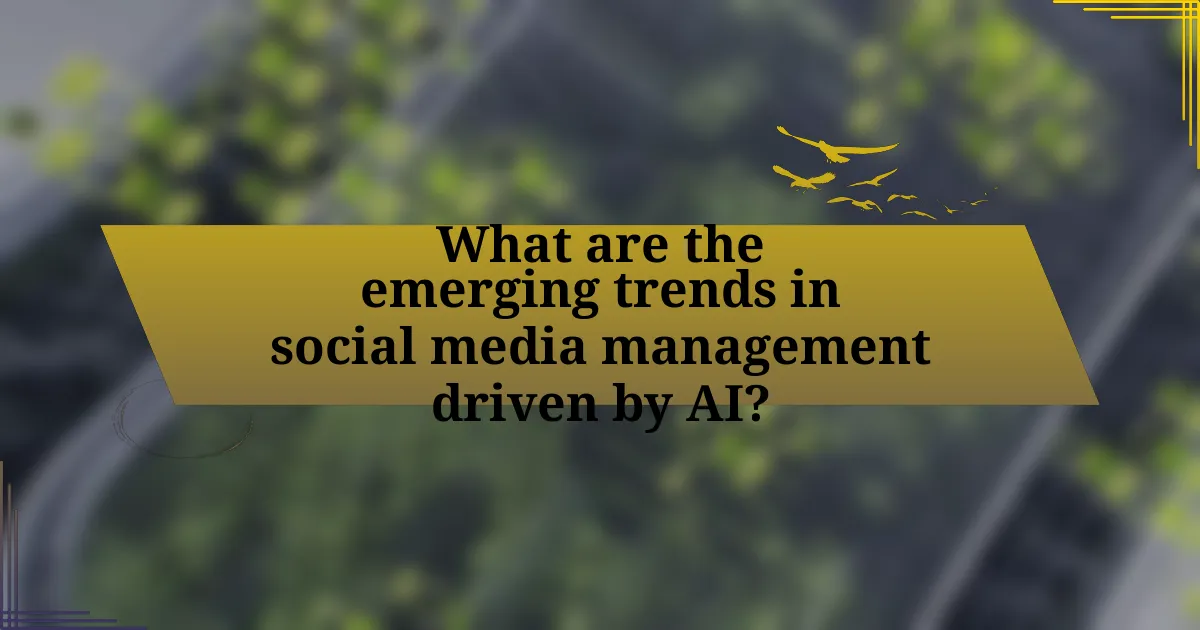The article “The Future of Social Media Management: AI Trends to Watch” explores the transformative impact of artificial intelligence on social media management. It highlights emerging trends such as enhanced content personalization, automated customer service, and advanced analytics for performance measurement. The article discusses how AI is revolutionizing content creation, improving audience insights, and enabling predictive analytics, while also addressing the tools available for AI-driven content generation. Additionally, it examines the ethical considerations and challenges businesses face when integrating AI into their social media strategies, as well as practical tips for effective implementation.

What are the emerging trends in social media management driven by AI?
Emerging trends in social media management driven by AI include enhanced content personalization, automated customer service, and advanced analytics for performance measurement. Enhanced content personalization utilizes AI algorithms to analyze user behavior and preferences, allowing brands to deliver tailored content that increases engagement. Automated customer service employs AI chatbots to provide instant responses to user inquiries, improving response times and customer satisfaction. Advanced analytics leverage AI to process vast amounts of data, enabling marketers to gain insights into campaign performance and audience behavior, which informs strategic decision-making. These trends reflect the growing integration of AI technologies in optimizing social media strategies and enhancing user experiences.
How is AI transforming content creation in social media management?
AI is transforming content creation in social media management by automating the generation of posts, analyzing audience engagement, and personalizing content strategies. This automation allows social media managers to produce high-quality content at scale, significantly reducing the time and effort required for manual creation. For instance, tools like OpenAI’s GPT-3 can generate text that aligns with brand voice and audience preferences, while AI-driven analytics platforms can assess which types of content resonate most with specific demographics. According to a report by HubSpot, 70% of marketers believe that AI will significantly impact their content strategy, highlighting its growing importance in optimizing social media efforts.
What tools are available for AI-driven content generation?
AI-driven content generation tools include platforms like OpenAI’s ChatGPT, Jasper, and Copy.ai. These tools utilize advanced natural language processing algorithms to create high-quality written content efficiently. For instance, OpenAI’s ChatGPT can generate articles, social media posts, and marketing copy by understanding context and user prompts, demonstrating its versatility in content creation. Jasper and Copy.ai also offer similar functionalities, allowing users to produce engaging content tailored to specific audiences and purposes. These tools have gained popularity due to their ability to save time and enhance creativity in content production.
How does AI enhance personalization in social media posts?
AI enhances personalization in social media posts by analyzing user data to tailor content that aligns with individual preferences and behaviors. This process involves machine learning algorithms that assess factors such as user interactions, demographics, and interests to create customized experiences. For instance, platforms like Facebook and Instagram utilize AI to recommend posts, ads, and connections based on users’ past activities, leading to increased engagement. Research indicates that personalized content can boost user interaction rates by up to 74%, demonstrating the effectiveness of AI-driven personalization in enhancing user experience on social media.
What role does AI play in social media analytics?
AI plays a crucial role in social media analytics by enabling the processing and analysis of vast amounts of data to derive actionable insights. Through machine learning algorithms, AI can identify patterns in user behavior, sentiment, and engagement metrics, allowing businesses to tailor their strategies effectively. For instance, AI-driven tools can analyze millions of social media posts in real-time to gauge public sentiment about a brand, product, or event, providing companies with immediate feedback and the ability to respond proactively. This capability is supported by research from the Harvard Business Review, which highlights that organizations leveraging AI in analytics can improve decision-making speed and accuracy, ultimately enhancing their competitive edge in the market.
How can AI improve audience insights and engagement metrics?
AI can enhance audience insights and engagement metrics by analyzing vast amounts of data to identify patterns and preferences among users. This capability allows businesses to tailor their content and marketing strategies more effectively. For instance, AI algorithms can process user interactions, demographics, and behavior across social media platforms, leading to more accurate segmentation of audiences. According to a report by McKinsey, companies that leverage AI for customer insights can increase their marketing ROI by 15-20%. This data-driven approach enables organizations to optimize their engagement strategies, resulting in higher interaction rates and improved customer satisfaction.
What predictive analytics capabilities does AI offer for social media strategies?
AI offers predictive analytics capabilities for social media strategies by analyzing user behavior, engagement patterns, and content performance to forecast future trends and outcomes. These capabilities enable brands to optimize their content strategies, target specific audiences more effectively, and enhance customer engagement. For instance, AI algorithms can process vast amounts of data from social media interactions to identify which types of posts generate the most engagement, allowing marketers to tailor their content accordingly. Additionally, predictive models can assess the likelihood of a campaign’s success based on historical data, helping businesses allocate resources more efficiently.

How can businesses leverage AI for effective social media management?
Businesses can leverage AI for effective social media management by utilizing automated content creation, sentiment analysis, and targeted advertising. Automated content creation tools, such as those powered by natural language processing, enable businesses to generate engaging posts quickly, enhancing their online presence. Sentiment analysis algorithms can analyze user interactions and feedback, allowing businesses to understand audience perceptions and adjust their strategies accordingly. Additionally, AI-driven targeted advertising optimizes ad placements by analyzing user data, ensuring that marketing efforts reach the most relevant audiences. According to a report by Gartner, 63% of marketers believe that AI will significantly impact their social media strategies, highlighting its growing importance in the field.
What are the best practices for integrating AI into social media strategies?
The best practices for integrating AI into social media strategies include leveraging data analytics for audience insights, utilizing chatbots for customer engagement, and employing AI-driven content creation tools. Data analytics enables brands to understand audience behavior and preferences, leading to more targeted campaigns. Chatbots enhance customer service by providing instant responses, improving user experience and satisfaction. AI-driven content creation tools assist in generating personalized content at scale, which can increase engagement rates. According to a report by McKinsey, companies that effectively use AI in marketing can increase their profitability by 5 to 10 percent, demonstrating the significant impact of these practices.
How can businesses measure the success of AI-driven social media campaigns?
Businesses can measure the success of AI-driven social media campaigns through key performance indicators (KPIs) such as engagement rates, conversion rates, and return on investment (ROI). Engagement rates, which include likes, shares, and comments, indicate how well the content resonates with the audience. Conversion rates track the percentage of users who take a desired action, such as signing up for a newsletter or making a purchase, directly linked to the campaign. ROI quantifies the financial return generated from the campaign relative to its cost, providing a clear picture of its effectiveness. According to a report by HubSpot, companies that utilize AI in their marketing strategies see a 14% increase in sales productivity and a 12% reduction in marketing costs, demonstrating the tangible benefits of AI-driven campaigns.
What challenges might businesses face when adopting AI in social media management?
Businesses may face several challenges when adopting AI in social media management, including data privacy concerns, integration complexities, and the need for skilled personnel. Data privacy issues arise as companies must navigate regulations like GDPR, which require careful handling of user data. Integration complexities occur when businesses attempt to merge AI tools with existing systems, often leading to technical difficulties and increased costs. Additionally, the demand for skilled personnel to manage and interpret AI outputs can strain resources, as there is a shortage of professionals with expertise in both AI and social media strategies. These challenges can hinder the effective implementation of AI technologies in social media management.
What ethical considerations should be taken into account with AI in social media?
Ethical considerations for AI in social media include user privacy, algorithmic bias, and misinformation. User privacy is critical as AI systems often collect and analyze vast amounts of personal data, raising concerns about consent and data security. For instance, a 2021 report by the Electronic Frontier Foundation highlighted that many social media platforms fail to adequately inform users about data usage, leading to potential violations of privacy rights. Algorithmic bias is another significant concern, as AI can perpetuate existing societal biases, resulting in unfair treatment of certain groups. Research from MIT Media Lab found that facial recognition systems had higher error rates for individuals with darker skin tones, illustrating the need for fairness in AI algorithms. Lastly, the spread of misinformation through AI-generated content poses a threat to public discourse and trust in information sources, as evidenced by studies showing that false information spreads faster on social media than factual content. Addressing these ethical considerations is essential for responsible AI deployment in social media.
How can businesses ensure transparency in AI algorithms used for social media?
Businesses can ensure transparency in AI algorithms used for social media by implementing clear documentation and communication strategies regarding their AI systems. This includes providing accessible information about how algorithms function, the data they utilize, and the decision-making processes involved. For instance, companies like Facebook have initiated transparency reports that outline algorithm changes and their impacts on user experience, which helps users understand the underlying mechanisms. Additionally, engaging third-party audits can validate the fairness and accountability of AI systems, further enhancing trust.
What are the implications of AI on user privacy in social media platforms?
AI significantly impacts user privacy on social media platforms by enabling extensive data collection and analysis. This technology allows platforms to gather vast amounts of personal information, including user behavior, preferences, and interactions, often without explicit consent. For instance, a study by the Pew Research Center found that 79% of Americans are concerned about how their data is being used by companies, highlighting the widespread apprehension regarding privacy. Furthermore, AI algorithms can create detailed user profiles, which can be exploited for targeted advertising and content manipulation, raising ethical concerns about user autonomy and informed consent. The Cambridge Analytica scandal exemplifies the potential misuse of AI in harvesting personal data for political purposes, underscoring the urgent need for robust privacy regulations in the age of AI-driven social media.

What future developments can we expect in AI and social media management?
Future developments in AI and social media management will likely include enhanced automation, improved personalization, and advanced analytics capabilities. Automation tools will streamline content scheduling and customer interactions, allowing brands to engage with their audience more efficiently. Improved personalization will leverage AI algorithms to analyze user behavior and preferences, enabling tailored content delivery that increases engagement rates. Advanced analytics will provide deeper insights into campaign performance and audience sentiment, facilitating data-driven decision-making. According to a report by Gartner, by 2025, 80% of social media management tasks will be automated, highlighting the significant shift towards AI-driven solutions in this field.
How will advancements in AI technology shape the future of social media platforms?
Advancements in AI technology will significantly shape the future of social media platforms by enhancing user experience through personalized content delivery and improved engagement strategies. AI algorithms will analyze user behavior and preferences, allowing platforms to curate tailored feeds that increase user satisfaction and retention. For instance, a study by McKinsey & Company found that companies leveraging AI for personalization can see a 10-30% increase in engagement rates. Additionally, AI will facilitate better content moderation, reducing the prevalence of harmful content and misinformation, which is crucial for maintaining user trust. According to a report from the Pew Research Center, 64% of Americans believe social media companies should do more to combat misinformation. Thus, the integration of AI technologies will not only optimize user interactions but also enhance the overall integrity of social media environments.
What innovations are on the horizon for AI in social media marketing?
Innovations on the horizon for AI in social media marketing include advanced predictive analytics, enhanced personalization, and the integration of augmented reality (AR) experiences. Advanced predictive analytics will enable marketers to forecast trends and consumer behavior more accurately, allowing for data-driven decision-making. Enhanced personalization will leverage AI algorithms to tailor content and advertisements to individual user preferences, significantly improving engagement rates. The integration of AR experiences will allow brands to create immersive campaigns that enhance user interaction and brand recall. These innovations are supported by the increasing capabilities of machine learning and data processing technologies, which are evolving rapidly in the marketing landscape.
How might user behavior change with the evolution of AI in social media?
User behavior may change significantly with the evolution of AI in social media by increasing personalization and engagement. As AI algorithms become more sophisticated, they will analyze user preferences and behaviors to deliver tailored content, leading to higher interaction rates. For instance, a study by Pew Research Center found that 72% of users prefer personalized content, indicating a shift towards more curated experiences. Additionally, AI-driven chatbots and virtual assistants will facilitate real-time communication, making users more likely to engage with brands and communities. This evolution will likely result in users spending more time on platforms that offer relevant and engaging interactions, ultimately transforming their social media habits.
What practical tips can businesses implement for AI-driven social media management?
Businesses can implement several practical tips for AI-driven social media management, including utilizing AI tools for content scheduling, leveraging sentiment analysis for audience engagement, and employing chatbots for customer service. AI tools like Hootsuite and Buffer automate the scheduling of posts, ensuring consistent online presence and optimal timing for audience reach. Sentiment analysis tools, such as Brandwatch, help businesses understand audience reactions to their content, allowing for tailored engagement strategies. Additionally, chatbots, powered by AI, can provide instant responses to customer inquiries, enhancing user experience and operational efficiency. These strategies not only streamline social media management but also improve overall engagement and customer satisfaction.
How can companies start small with AI tools in their social media strategy?
Companies can start small with AI tools in their social media strategy by implementing basic automation features, such as scheduling posts and analyzing engagement metrics. For instance, tools like Hootsuite and Buffer allow businesses to automate their posting schedule, which can save time and ensure consistent content delivery. Additionally, using AI-driven analytics tools like Sprout Social can help companies understand audience behavior and optimize their content strategy based on data insights. According to a report by Gartner, 80% of marketers believe that AI will revolutionize their industry, highlighting the importance of integrating AI tools even at a small scale.
What resources are available for learning about AI in social media management?
Online courses, webinars, and industry reports are valuable resources for learning about AI in social media management. Platforms like Coursera and Udemy offer courses specifically focused on AI applications in social media, while webinars hosted by industry leaders provide insights into current trends and tools. Additionally, reports from organizations such as Gartner and McKinsey analyze the impact of AI on social media strategies, offering data-driven insights that can enhance understanding.

